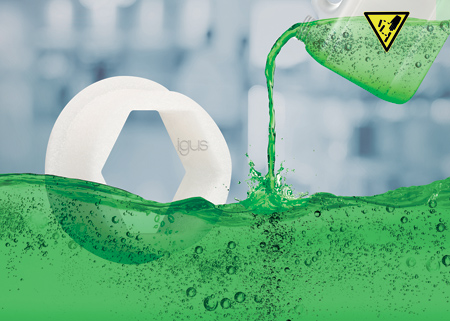
Chemical-resistant, self-lubricating and maintenance-free: with the iglide i10 laser sintering 3D printing material, customers quickly get their prototypes and small production volumes.
igus offers chemical-resistant, self-lubricating, tribo-polymer components that can be manufactured using selective laser sintering (SLS). This is made possible by iglide i10, a printing material for laser sintering printers. The material is resistant to acids, bases, alcohols and greases and is therefore suitable for use in industries such as electroplating and food processing.
The laser sintering printing material is also characterized by its high ductility and low moisture absorption. The iglide i10 material is suited for weight-saving industrial functional components with elastic properties.
There are numerous applications for the printing material. 3D-printed components in electrolytic baths for coating processes must be resistant to acids; otherwise, defects and possible system failures are at risk.
igus also offers the printing material in its in-house 3D printing service. Customers can upload a STEP file online with the 3D model of the desired component and select the quantity and printing material.
igus will then manufacture the self-lubricating and maintenance-free elements using SLS. A laser fuses wafer-thin powder layers of the material on a building platform, which is lowered layer by layer. Step by step, the component is created.
"The process has the advantage that it requires no tools and is significantly more cost-effective and faster than traditional processes such as injection molding. This is especially true for prototypes and small production volumes," explained Tom Krause, Head of Additive Manufacturing at igus.
As a result, the customer could receive the 3D-printed component five days after igus receives the order.
For more information contact:
igus, Inc.
P.O. Box 14349
East Providence, RI 02914
800-521-2747
sales@igus.com
www.igus.com